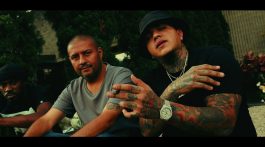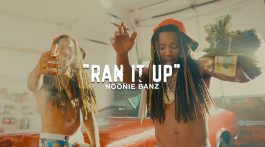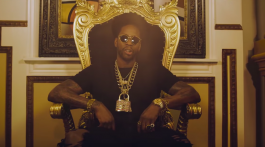On the AMC drama Mad Men, 71 percent of the business falls off the books as soon as Lucky Strike walks out the door. Panic sets in, and Don Draper – creative director of the ad agency – pulls the only card he seems to have left. In a full-page letter to the New York Times titled, "Why I'm Quitting Tobacco," Don writes of the ill effects of cigarettes, saying, "If you're interested in cigarette work, here are a list of agencies that do it well." He lists every single one of his company's competitors. It's a shrewd move, desperate as it is.
In the more real world of hip-hop – which is also no less fake – Young Jeezy has similarly managed to change the conversation. Whereas it was once about Jeezy's cold streak, now the conversation is once again about authenticity, or that's the message coming from his new documentary, a side-piece product to the long-awaited album TM103 (out December 20th).
A Hustlaz Ambition, which premiered last night at New York's Landmark Sunshine Cinema, gave hip-hop fans two choices: go with the rappers who haven't lived what they rap about, or go with Young Jeezy. "He's believable," says Drake in the film. "He lived that."
is a whack-a-mole point, hit over and over again, by Jay-Z and Diddy; by eight-year-olds posted on the block; by a rep from Obama's 2008 presidential campaign. T.I. adds, "You've gotta be cut from a certain cloth to talk this." The argument Jeezy makes throughout seems directed entirely at one rapper in particular: Rick Ross, who was once a corrections officer named William Roberts. (Jeezy and Ross exist on terms that border on unfriendly, sometimes crossing over that line.
) Sure, the question of authenticity makes for compelling conversation, just as it did in the 1990s, but it's not foolproof – a rap sheet doesn't make music. In any case, the documentary forgives Tupac, whose personal history didn't match his persona – he was one of Jeezy's childhood musical idols, along with Da Brat. And so it's too bad that the possible motives behind the filmmaking cloud the picture. It should exist on its own: Jeezy's history is unbelievable, which is to say that it's almost too real. He can't remember the exact age he started dealing crack, but it was young – "Shit, I was probably 11.
" His mother, drinking, would displace anger toward his absent father on young Young Jeezy. She would spit words in his face: "Pussy. Face like a pussy. Nigga." Unable to coexist, Jeezy left, dealing drugs out of his grandmother's house in the wee hours before middle school, avoiding cops who jumped out of ice cream trucks so as to be undetected. He says, "I served my uncles, I served my family. I whooped my uncles for stealing my shit." The lowest moment onscreen comes when he finds his mother at a crackhouse, and he's unsure of whether to beat her or the people who sold her crack – and then he realizes that he is them and they are him. "It was a reality check," Jeezy says.
"You think it's your way out [of the trap], but it's taking your mama out." (He and his mother have since reconciled; she appears throughout the film.) There are lighter moments, of course, thank God. (Expect no less of the man who invented the 'Ha-Ha!' ad-lib.) The film opens with Jeezy explaining how he had to stop his plane to pick up a huge payment on a European runway. He gets the check in hand, only to stop the plane again: "I didn't know how to cash a check." Further in, Jeezy and his drug partner buy a recording studio, only to find that it's a studio in name only: There's nothing in it, absolutely nothing. Once they furnish it, they start a music label, because, sure.
More bad news: their first signee is immediately bussed to jail on a murder charge. Needing a rapper to just rap, someone turns to Jeezy and asks the age-old question, "Shit, you wanna try this shit?" Jeezy, who is absolutely not a rapper, begins talking, rolling his voice like hot coals over the beats, filling in empty spots with "Ayyy!" and whatever else. History, made. All of the hit records, all of the money, based off of a fleeting whim.
The story holds interest well: it's a friendly reminder of who Jeezy is and everything he stands for. Unfortunately, for an arthouse film, it's inartfully made, as if director Chris Robinson directed one of his underlings to direct someone else to direct it. Samuel L. Jackson narrates, stretching the word "money" until it sounds like a he's playing a character – Jules Winnfield doing an audition.
The pacing is a bit askew, a rush through a worthy life story; Jeezy's battle with Bell's palsy is treated as just another speed bump, introduced and dismissed within a minute's time. And yet – even with all of the flaws, and there are many – the story holds everything together, which is clearly the most important thing to Jeezy
. Read more: http://www.rollingstone.com/music/news/young-jeezy-recalls-crack-dealing-past-in-new-doc-20111130#ixzz1fEAbJw3x












No Comment